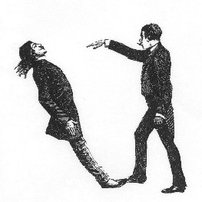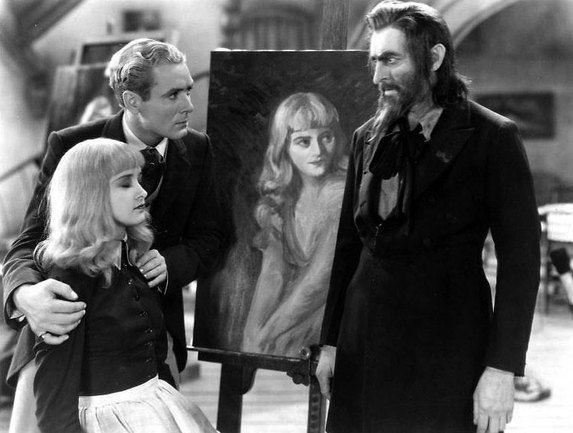
By Sharon Hill
The JREF twitter account @jref received some requests to look into an odd story out of the UK earlier this month. A man dubbed the “hypnotist thief” was recorded on security video putting the owner of a shop in a sort of “trance” before robbing him. Is it possible to be hypnotized like this? Many were skeptical. We contacted an expert to find out what may be behind this.
The suspect is shown in the video brushing past the store owner, Mr. (Aziz) Haider, then gently tapping him on the arm. In this casual interaction, Aziz appears mesmerized and compliant as the robber removes his wallet, squeezes Aziz’ shoulder, pats his chest, makes some hand gestures, then exits. Suddenly, Aziz seems to realize his wallet is gone and runs out after the thief. The police reported that Aziz said he did not recall what had happened to him during the robbery. Officials think it was a distractive parlor trick by a person who was obviously well-practiced. The information given in the news stories is limited and we are left without important details like what was said between the men (the video has no sound) and if he had seen the thief before.
The JREF twitter account @jref received some requests to look into an odd story out of the UK earlier this month. A man dubbed the “hypnotist thief” was recorded on security video putting the owner of a shop in a sort of “trance” before robbing him. Is it possible to be hypnotized like this? Many were skeptical. We contacted an expert to find out what may be behind this.
The suspect is shown in the video brushing past the store owner, Mr. (Aziz) Haider, then gently tapping him on the arm. In this casual interaction, Aziz appears mesmerized and compliant as the robber removes his wallet, squeezes Aziz’ shoulder, pats his chest, makes some hand gestures, then exits. Suddenly, Aziz seems to realize his wallet is gone and runs out after the thief. The police reported that Aziz said he did not recall what had happened to him during the robbery. Officials think it was a distractive parlor trick by a person who was obviously well-practiced. The information given in the news stories is limited and we are left without important details like what was said between the men (the video has no sound) and if he had seen the thief before.
See the video for yourself.
This isn’t the first time crime victims have claimed to have been “mesmerized” right before being robbed.
A Cantonese woman in Boston reported in 2012 that three young women hypnotized her right in the street convincing her to retrieve valuables from her home and hand them over to the thieves. She lost $160,000 in cash and jewelry.
Police in Germany investigated a number of crimes involving two Russian women who tell their victims they will read their fortune outside of a store. One victim, an older woman, claims she was put into a trance, lost her memory and also lost track of time when she was robbed by the women.
Hypnosis is also claimed to be a factor by some victims of sexual coercion.
Two women accused a Cleveland-area attorney of hypnotizing them for his sexual pleasure. They told authorities they believed they were hypnotized because they would lose track of time and could not recall what was discussed after meetings and phone calls with him.
An amateur hypnotist who was regularly “treating” a woman was accused of sexual assault after he convinced her to “block out all her senses except hearing” and then tried to cover up his indecent behavior. The 25-year old man pleaded guilty to a felony charge because the woman was unable to give consent as she was claimed to be “mentally incapacitated or physically helpless.”
Another self-taught hypnotist in Ireland put his client in trance, telling her he was her master and she was his sex slave. He was jailed for 18 months for sexually taking advantage of her without consent.
A Cantonese woman in Boston reported in 2012 that three young women hypnotized her right in the street convincing her to retrieve valuables from her home and hand them over to the thieves. She lost $160,000 in cash and jewelry.
Police in Germany investigated a number of crimes involving two Russian women who tell their victims they will read their fortune outside of a store. One victim, an older woman, claims she was put into a trance, lost her memory and also lost track of time when she was robbed by the women.
Hypnosis is also claimed to be a factor by some victims of sexual coercion.
Two women accused a Cleveland-area attorney of hypnotizing them for his sexual pleasure. They told authorities they believed they were hypnotized because they would lose track of time and could not recall what was discussed after meetings and phone calls with him.
An amateur hypnotist who was regularly “treating” a woman was accused of sexual assault after he convinced her to “block out all her senses except hearing” and then tried to cover up his indecent behavior. The 25-year old man pleaded guilty to a felony charge because the woman was unable to give consent as she was claimed to be “mentally incapacitated or physically helpless.”
Another self-taught hypnotist in Ireland put his client in trance, telling her he was her master and she was his sex slave. He was jailed for 18 months for sexually taking advantage of her without consent.
In all of these cases, using the explanation that the victim was “hypnotized” likely oversimplifies the situation and suggests that the ability to mesmerize someone is like magic. It’s a learned skill to be coercive enough to fool people into giving you their valuables.
Danny Doyle has been a working stage hypnotist for several decades. He told the JREF that hypnosis is not like the Jedi mind trick. “Any reasonable definition of hypnosis includes a cooperative element.”
A professional psychotherapist quoted in the Boston story noted that the hypnotist has to have a rapport and trust with the hypnotee. In the case of stage hypnosis, Doyle says, ”When people come on stage there is sort of an unspoken contract we have. I will not embarrass you, I will not let you get hurt and for that you sort of let me make these suggestions. Once I would break that sort of tacit agreement then the whole thing crumbles.”
The same unspoken trust could be built when a counsellor or member of the community interacts in a positive way with the person but then eventually takes advantage of them by pushing suggestions ethically too far.
Doyle says that we don’t really understand what is going on in the mind during hypnosis. There isn’t even an undisputed definition for what hypnosis is - it’s not tangible or quantifiable. Yet, hypnosis is known to include a good bit of anticipation and expectation. Doyle admits he has it easy because people know what to expect from stage hypnotism and want to comply.
There is a dispute among the wide spectrum of “hypnotists” on whether hypnosis constitutes deliberate social compliance from the subject, if they actually enter into an altered state of consciousness, or if certain people can be deluded into thinking they are in an altered state of consciousness and proceed to act in a certain way, letting go of normal inhibitions. Our pop culture depiction of hypnotism helps to convince the public that the ability to hypnotize (like Svengali) is a special power; and the hypnotic state somehow makes you lose all control of your reason and faculties. If victims think they are being hypnotized, they may feel like they are under a spell.
Danny Doyle has been a working stage hypnotist for several decades. He told the JREF that hypnosis is not like the Jedi mind trick. “Any reasonable definition of hypnosis includes a cooperative element.”
A professional psychotherapist quoted in the Boston story noted that the hypnotist has to have a rapport and trust with the hypnotee. In the case of stage hypnosis, Doyle says, ”When people come on stage there is sort of an unspoken contract we have. I will not embarrass you, I will not let you get hurt and for that you sort of let me make these suggestions. Once I would break that sort of tacit agreement then the whole thing crumbles.”
The same unspoken trust could be built when a counsellor or member of the community interacts in a positive way with the person but then eventually takes advantage of them by pushing suggestions ethically too far.
Doyle says that we don’t really understand what is going on in the mind during hypnosis. There isn’t even an undisputed definition for what hypnosis is - it’s not tangible or quantifiable. Yet, hypnosis is known to include a good bit of anticipation and expectation. Doyle admits he has it easy because people know what to expect from stage hypnotism and want to comply.
There is a dispute among the wide spectrum of “hypnotists” on whether hypnosis constitutes deliberate social compliance from the subject, if they actually enter into an altered state of consciousness, or if certain people can be deluded into thinking they are in an altered state of consciousness and proceed to act in a certain way, letting go of normal inhibitions. Our pop culture depiction of hypnotism helps to convince the public that the ability to hypnotize (like Svengali) is a special power; and the hypnotic state somehow makes you lose all control of your reason and faculties. If victims think they are being hypnotized, they may feel like they are under a spell.
Skeptic writer Jim Lippard covered hypnosis in crime in a paper entitled Hypnosis, Voluntary Action, and the Law. He writes:
There are a number of cases where hypnosis has been used as a method to induce participation in the commission of criminal acts. In most cases, hypnosis was probably either not a necessary component or was effective only because the subject had a belief about hypnosis that made it effective and was also at least unconsciously willing to go along with the acts.
The actions may FEEL involuntary. Yet, most subjects of hypnosis can resist suggestions if they wish to do so, especially if they are asked to do something too dangerous or exploitive. Unfortunately, this veers close to “blaming the victim” but it’s just not that straightforward. Other factors involved could be fear of authority figures or circumstances particular to the situation that makes extracting oneself from the event difficult or seemingly impossible. Or, they could just be caught off guard and not know how to respond to confusing behavior.
There are also other factors to consider. Did these women who were robbed in the street have a medical condition that caused them to forget? Were they traumatized or embarrassed and so used hypnosis as an excuse to make sense of it?
Danny Doyle is skeptical of this wave of hypno-crime. “My first thought is that before anyone makes any decisions about if it is "real" or not the first thing needed is to investigate.” In the hypnothief robbery, did the shopkeeper know the robber? Is there some connection between them? Doyle thinks that this may require more work by the police that they are inclined to do.
“The very idea that somehow you control someone and take their money and such, well it just seems to need more investigation,” says Doyle, who cites a law enforcement background.
There are also other factors to consider. Did these women who were robbed in the street have a medical condition that caused them to forget? Were they traumatized or embarrassed and so used hypnosis as an excuse to make sense of it?
Danny Doyle is skeptical of this wave of hypno-crime. “My first thought is that before anyone makes any decisions about if it is "real" or not the first thing needed is to investigate.” In the hypnothief robbery, did the shopkeeper know the robber? Is there some connection between them? Doyle thinks that this may require more work by the police that they are inclined to do.
“The very idea that somehow you control someone and take their money and such, well it just seems to need more investigation,” says Doyle, who cites a law enforcement background.

He notes there is no audio in the recording which makes analysis difficult and prevents us from observing that the thief may not be doing any sort of hypnosis at all. “If he is just a good pickpocket and directing his attention other places then the [hypnosis] question is moot. What is he saying? IF this was "hypnosis" then why didn't he have the guy give him all the money out of the register? Why only take what was in his pocket?”
Doyle also observes that the scene was rather theatrical and could have been staged. There is always a possibility in these days of rampant hoaxes that the media and police were duped.
Unfortunately, we hardly ever see follow-ups on such strange news stories so we can’t tell if the police ever got to the bottom of it.
The bottom line is the hypnothief may not be all that mysterious. It’s not plausible to accept that the shopkeeper was suddenly hypnotized into an altered state of consciousness. Remember, Doyle tells us, “ALL hypnosis is SELF hypnosis - you do not ‘hypnotize’ someone else.” But it sure seems the public is mesmerized by the idea that we can be so easily coerced and duped just going about our business. Svengali-like all-controlling hypnosis is a myth. The truth may be weirder.
Doyle also observes that the scene was rather theatrical and could have been staged. There is always a possibility in these days of rampant hoaxes that the media and police were duped.
Unfortunately, we hardly ever see follow-ups on such strange news stories so we can’t tell if the police ever got to the bottom of it.
The bottom line is the hypnothief may not be all that mysterious. It’s not plausible to accept that the shopkeeper was suddenly hypnotized into an altered state of consciousness. Remember, Doyle tells us, “ALL hypnosis is SELF hypnosis - you do not ‘hypnotize’ someone else.” But it sure seems the public is mesmerized by the idea that we can be so easily coerced and duped just going about our business. Svengali-like all-controlling hypnosis is a myth. The truth may be weirder.
Sharon Hill, P.G., EdM, is a geologist with a specialty in science and society and public outreach for science. She is the creator and editor of the unique critical thinking blog DoubtfulNews.com and researches, writes and speaks about the paranormal, monsters and natural phenomena for various publications including Skeptical Inquirer and Fortean Times. Follow her on Twitter @idoubtit.




